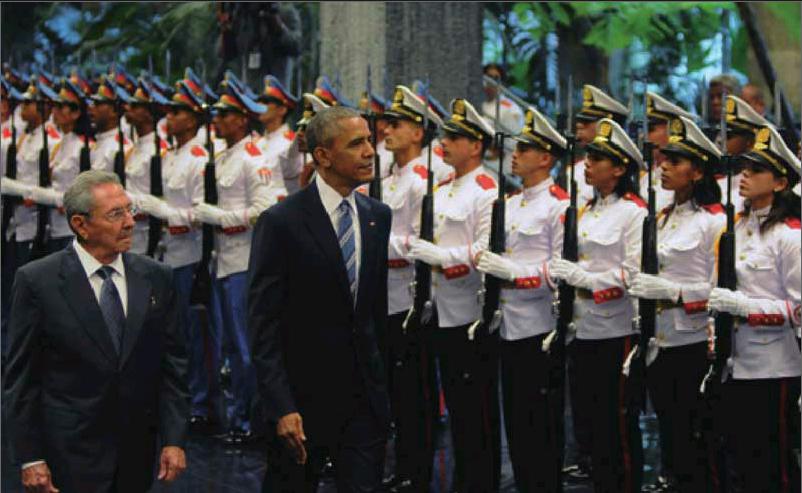An Awkward Detente
2016-04-13ByBaiShi
By+Bai+Shi

Americas ongoing presidential cam- paign was temporarily upstaged by U.S. President Barack Obamas historic state visit to Cuba on March 20-22.
There is no doubt that Obamas visit to Cuba—which was in the epicenter of a nuclear confrontation during the Cold War—is of great significance. Obama became the first sitting U.S. President to visit the country in 88 years since Calvin Coolidges visit to Cuba in 1928.
During his stay in Havana, Obama made history for U.S.-Cuban relations in a number of ways, including his address on the history and future of the two nations which was aired throughout the width and breadth of Cuba. Obama also attended an event on entrepreneurship wherein he encouraged Cubans to start their own businesses within their countrys command economy.
At a speech given to the Cuban people at the Grand Theater Havana on March 22, Obama said, “I have come here to bury the last remnant of the Cold War in the Americas. I have come here to extend the hand of friendship to the Cuban people.”
Even so, nothing tangible was produced during the meeting between Obama and his counterpart Raul Castro, though the U.S. president claimed that it is time to “leave the past behind” and “look forward to the future together.”
A rocky path
Although a new page was drafted into the annals of American history, why didnt the visit bear a more substantial outcome? Why werent any further agreements reached in what would otherwise be an elaborate tourist visit?
“There is still a wide division between the two sides on many critical issues,” said Xu Shicheng, a researcher at the Institute of Latin American Studies under the Chinese Academy of Social Sciences, in an interview with Asia Pacific Daily.
The case in point was made by the conspicuous absence of a meeting between Obama and the former Cuban President Fidel Castro, now 89 years old. Obama met with Raul Castro, Fidels brother and current president.
The scars from the past are hard to forget for some, and many issues stand as obstacles for detente. One of the most pressing concerns for Cuba is the U.S. embargo against the country, which was adopted by the Kennedy administration and has been ongoing since 1962.
The embargo not only banned U.S.-Cuba trade and transport, but also affected Cubas trade with other countries. For example, according to the sanctions, if a cargo ship from any third country carried goods to Cuba, it would be not allowed to berth at a port on U.S. territories for the following six months. Also, any product that contains components made in the United States is not allowed to be exported to Cuba.
Cuba claimed that the country has suffered huge economic losses of over $100 billion since the embargos inception. Although the United States and Cuba restored their diplomatic relations last summer, the U.S. Government has not yet taken any step to completely lift the sanctions, said Xu.
During their meeting, both Obama and Raul Castro agreed that the embargo against Cuba should be put to an end.
“Ive called on our Congress to lift the embargo,” said Obama in his speech. “It is an outdated burden on the Cuban people. Its a burden on the Americans who want to work and do business or invest here in Cuba.”
Jia Xiudong, senior researcher at the China Institute of International Studies told the Peoples Daily that, ultimately, the U.S. Congress has the final say on whether or not to lift the embargo on Cuba.
As a president who vowed to seek changes during his tenure, Obama has made a good use of his executive power to change Americas policy on Cuba. For example, his administration has made breakthroughs in restoring mail services and flights between the two countries. However, Congress remains a barrier, said Jia.
From the beginning, Obamas efforts to improve relations with Cuba were controversial in the United States. A strong tide of opposition in Congress and in a large portion of CubanAmericans remains.
Nonetheless, a survey conducted by Pew Research Center from July 2015 found that 73 percent of Americans approved of the thaw in relations between the two countries, and that a similar share favored the ending of the trade embargo.
Another important issue is territorial in nature. Cuba insists in the return of its territory claimed by the U.S. Naval Station in Guantanamo Bay. The United States occupied the 117.6 square km area in 1903 through a lease act, which the current Cuban Government did not agree to after the Cuban Revolution in 1959.
Obama had repeatedly expressed his willingness to close the notorious Guantanamo Bay detention camp. But this decision also cannot take effect without approval from Congress.
On the other side of the fence, the United States demands that the Cuban Government compensate the United States for an estimated$8 billion in assets and investments that were confiscated by the revolutionary authorities in Cuba during the 1960s.
Furthermore, the two sides share few common grounds regarding human rights. Obama called on the Cuban Government to respect human rights and democracy in his speech in Havana. Raul Castro then countered at a joint press conference by pointing out a number of social problems in the United States, such as the lack of a universal healthcare system. In the communist country of Cuba, free healthcare coverage is available to every citizen. As the World Health Organization reported on its website, “The countrys primary healthcare system has produced enviable results as it continues to adapt to new challenges.”
A revolutionary take
Merely a week later, Fidel Castro criticized Obamas visit and warned his countrymen about the dangers of the United Statesinfluence.
In a 1,500 word column on Granma, the countrys official communist party mouthpiece, the former president and revolutionary excoriated Obama over a variety of contentious historical grievances.
Fidel Castro made special reference to Americas failed attempt to invade Cuba through the Bay of Pigs operation in 1961—the year Obama was born.
Responding to Obamas call for both countries to look to the future as friends, neighbors and as family, Fidel Castro claimed that, “Each of us assumed the risk of a heart attack upon hearing these words... After a merciless blockade that has lasted almost 60 years... mercenary invasions, and multiple acts of violence and strength?”
Fidel Castro criticized other aspects of the United States foreign policy, and advised Obama to reflect over history before attempting to elaborate theories on Cuban politics.
He culminated by warning that “nobody is under the illusion that the people of this noble and selfless country will surrender their rights and spiritual wealth.” He added that Cubans are“more than capable of producing the food and materials we need through the effort and intelligence of our people—we do not need the empire to give us anything.”
Larger implications
It is widely believed that the Obama administration will leave history with two important diplomatic legacies. One is the nuclear deal with Iran, and the other is the restoration of diplo- matic ties with Cuba.
Despite opposition, changing the policy on Cuba will help the United States consolidate strategic interests in Latin America, Xu noted, stressing that the move will also be a crucial step toward improving relations with other Latin American countries.
The U.S. embargo against Cuba has long been criticized by Latin American states. Because of their decades-long policy of hostility, the United States was isolated by many left-wing governments in Latin America. Therefore, improving ties with Cuba will also help the United States to weaken the unity of the remaining left-wing forces in the region, Xu added.
More importantly, Obama recognized that the embargo is outdated as a tool to isolate or overthrow Cubas revolutionary government. The United States can only exert influence on Cuba through increased contact, according to Xu.
Obama met with some Cuban dissidents and talked a lot about democracy during his stay in Cuba, which predictably sparked discontent from the Cuban Government. Xu believed that could be seen as an attempt to promote American values in Cuba. Exporting values to other countries in order to change them from within has always been an important aspect of U.S. foreign policy, said Xu.
To that end, the U.S. Government has not abandoned its intention to change Cuba. Obama has taken a different path with the same destination in mind, claimed Xu.
Jia said that the clock is ticking for Obama to make any more concrete efforts to lift the embargo, as his tenure ends in less than a year. Moving forward, the sanctions could leave the next administration with enough leeway to bargain with Cuba.
It is uncertain whether the next U.S. administration would follow Obamas policy on Cuba, stated Jia, adding that it wont be easy to eliminate the points of contention in the U.S.-Cuba relationship in the near future.
